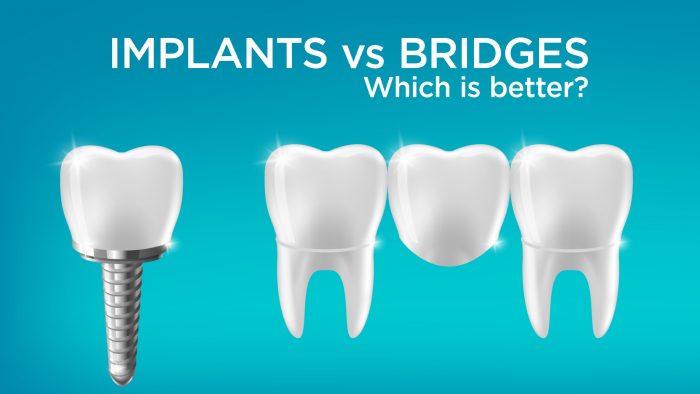Implants vs Bridges: Which is better?
September 3, 2021
Have you had your tooth extracted recently, and are looking for an appropriate replacement? If yes, then you have come to the right article.
You may have lost your tooth due to some form of decay or even trauma. But now the time has come to replace your lost tooth with a brand new one. When it comes to replacement of missing teeth, you have two main options. You can either go for an implant, or replace your tooth using a dental bridge.
But then, which one is better? This is an age old question, and we’ll discuss it in detail in this blog. Plenty of people are confused when they go to the dentist and are given these two options to choose from. With the help of this article you can make an informed decision on the best way to get your tooth replaced.
First of all, let us understand what an implant and a dental bridge actually are.
Dental Implant
A dental implant is a titanium screw-shaped structure that is surgically placed in your jaw bone. The implant acts as a root of your new tooth. A dental crown is then attached to it, and thus your tooth is replaced. The placement of the dental implant itself is a surgical procedure. Dental implants have become the norm now, and they’re the most acceptable treatment choice for replacing lost teeth. They have a success rate of about 95%.
Dental Bridge
A dental bridge, also called a crown and bridge or a fixed partial denture (FPD), is a structure that helps in replacing your tooth with the support of teeth adjacent to your missing tooth. As the name suggests, it ‘bridges’ the gap between your two teeth where the adjacent teeth act as pillars. This is a more traditional form of tooth replacement, and requires preparation of the adjacent teeth, also called as the abutment teeth.
Advantages of Dental Implant
- Your tooth can be replaced without the involvement or preparation of any other teeth. Hence implants are more conservative.
- Has an excellent track record, with a success rate of about 95%
- Can be used to fix teeth where a dental bridge is not possible because of absence of abutment or supporting teeth.
- Multiple implants can be placed to restore the entire arch, and rehabilitate a patient with no teeth.
Disadvantages of Dental Implants
- Requires a surgical procedure.
- A waiting period of upto 3 months may be required after the surgery, before the crown can be placed.
- Dental implants can be expensive
- Can only be placed if certain criteria are met with respect to the patient’s overall health, oral habits and hygiene, and bone quality.
Advantages of Dental Bridge
- It is more economical than implants.
- Treatment time is quicker, and your teeth can be replaced in about a week or less.
- No surgical procedure is required.
Disadvantages of Dental Bridge
- Not conservative since perfectly healthy abutment/supporting teeth have to be prepared/reduced in order to fix the bridge.
- Incorrect treatment planning may put undue stress on supporting teeth, thereby weakening them.
- Healthy teeth at either side of the empty tooth space are required for a bridge. If no teeth are present at either end, a dental bridge cannot be placed.
- Loss of too many teeth cannot be fixed with the help of a dental bridge.
Final Word
As of now, both implants and bridges are acceptable forms of treatment for replacing missing teeth. Dental implants have definitely grown in popularity because of their conservative nature. But, what is ideal for you may be dependent on many factors like time constraint, budget, the current condition of your teeth, your overall health and your dentist’s diagnosis.
The positives and negatives of both are given above, so that you read carefully, discuss openly with your dentist and then make an informed decision.



















































